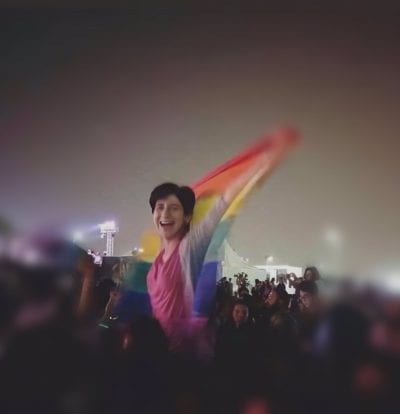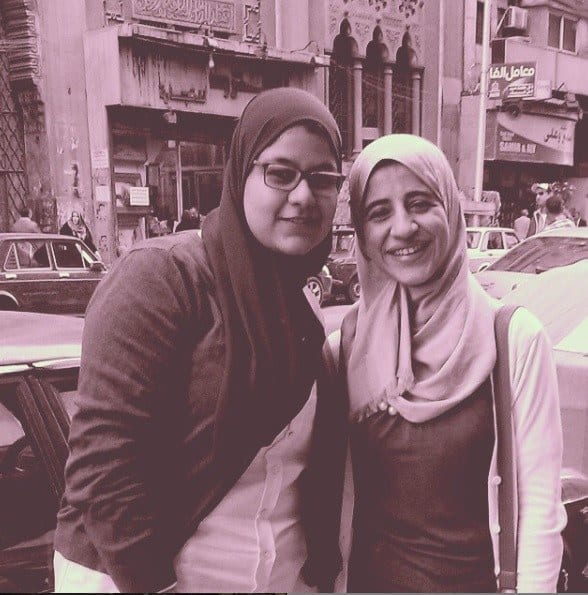The death of the Egyptian activist Sarah Hegazi revealed that a long history of bullying, as well as rampant social stigma, are in practical terms, lethal verbal instruments, always to be used against those considered to be opponents to the system. Sarah was labelled a “disbeliever” and a “lesbian” by Islamists, traditionalists and others from various educational classes, who believed that she deserved no prayers of mercy, alongside everyone who sympathized with her death.
Cyberspace is full of little pseudo-ISIS members; those are the people Sarah referred to as the real murderers when she was alive. They are the ignorant portion of the middle class, about whom Sarah expressed: “The matter isn’t related solely to religion or conservative culture! It is much deeper than that! This is a class that founded hatred, physical and psychological violence, sexual harassment and bullying, and created a culture out of them, passed on from generation to generation, against anyone that diverges from the herd. It is the class with the loudest voice in society, which is why exposing and criticizing it, is a duty.”

Sarah Hegazi has managed to express herself eloquently in various contexts, despite acquiring a stammer since her imprisonment experience, a common symptom of post-traumatic stress disorder. In her photograph, during Mashrou Laila’s concert in Cairo in 2017, she’d stretched the rainbow flag behind her back, the flag expressing her desire to break through all the prohibitions that had been placed on her, and others like her. The flag appears to be taking the shape of two fluttering wings, elevating Sarah’s legs off the floor so that she could levitate away. In her suicide note, Sarah melancholically draws a picture of her reality before her death, expressing her forgiveness despite the brutality of the journey of her recovery: “to my siblings… I tried to survive but failed … forgive me… to my friends… this experience is cruel and I’m too weak to bear with it… forgive me… to the world… you were extremely cruel… but I forgive.”
Superwoman
The news reported that the Egyptian activist, Sarah Hegazi, had committed “suicide”. In truth, I couldn’t deal with the news of her death as suicide. Despite the extent of the painful tragedy, one scene, that was closer to cinematic fiction, dominated my thoughts; I imagined Sarah as a “superwoman”, floating upwards carrying a large suitcase, in which she’d gathered up everything that might harm her city, to explode away from the ground in a huge bang. At the moment of explosion, Sarah would shine a gleaming light on the spot she cared most about, the middle Egyptian class; a dismissive, horrifyingly persistent class, that rejects any attempts to change its socially tormenting values.
This fantasy that portrays Sarah Hegazi as a “superwoman” does not go hand in hand with the idea of propaganda , although philosophies and cinema have only thus far published the images of a male superman. However, Sarah Hegazi’s journey closely resembles the perception of Nietzsche, the philosopher, about man, transcending obsolete values, tending towards demolishing idols, rationalizing morals, and deconstructing concepts like God, virtue, and metaphysics to minimize the specific concepts of the human himself. Above all, what had granted man superiority was his courage. In my opinion, Sarah Hegazi was the closest to that creative theory, as she’d involved herself in her project as an activist and a citizen with the courage of a “superwoman”, from within her middle social class.
Her immigration to Canada did not put an end to her nostalgia for her family, community and memories. For what does it mean to live in exile, lose your mother and siblings, and get chased by stigmatizing and painful online messages, all during a therapeutic recovery journey? It was certainly a troubled one, during which Sarah tried to commit suicide twice, until she managed to end her life in the third attempt.
Sarah Hegazi tried to heal herself from the evils of that social class and its imminent danger to women in particular, after that class had brutalized the discourse of the Islamic renaissance with the panicked desire to protect their values, and the fear of melting into the “unruly West”. This is a kind of Islamic narrative that was established by “Business” sheikhs over years, enhanced by the state to protect its authority over the people, since it is a religious state that is hostile to secularism, framing it as a discourse that incites opposition in all its forms.
The power of this class was used incredibly cruelly on Sarah Hegazi, facing a young girl who didn’t adorn anything but her innocent smile, sincere human discourse, in solidarity with everyone, and believing that good will be victorious over evil, in its purest form. She had a simple method to analyze that class which she’d clearly believed was the plague of the society. According to Sarah, the middle class that supports radical Islamism as well as the oppression of rulers, will soon with time help these systems turn into barricades to suppress and stigmatize the people, molding them into one uniform format. Despite this, Sarah, among others, managed to wander off from that hostile class, which had stigmatized her with the characteristics of disbeliever and homosexual even after she had passed.
In one of her articles, Hegazi wrote, “The Egyptian middle class always tends towards the conservative right-wing, religiously and socially always. That’s why it supports governmental decisions in matters of imposing guardianship and censorship on society, art and others. It simply establishes the social, cultural structural foundations of society as a whole. People of the middle class then socially stigmatize all those who rebel against that oppressive patriarchal culture, which is based on the oppression of women, workers, religious and gender minorities”.


Sarah Hegazi’s battle with her social class began with the first spark of the revolution when she participated in the demonstrations, up until the moment she took off her hijab. This was when it was revealed that her family belonged to this cruel middle class she’d been fighting, beginning with the physical and psychological violence that her uncle practiced on her, who took the place of her deceased father, alongside the bullying from the rest of the males in her family, given that she was the eldest daughter with only one younger sister. It was a family of females bound to endure an intensive blockade, and yet Sarah managed to escape this spider web of a narrative with short hair, riding her bicycle she’d labelled “Farwla” (“Strawberry”) to more welcome planets, where would fearlessly go on to discover her sexual orientation.
The incident of her arrest, took place against the backdrop of her raising the rainbow flag at the Mashrou Laila concert in 2017, another confrontation for the dreamer… She hadn’t yet recovered from the domestic and social violence at home, when she fell into the grip of security-based violence that punished her using electric shocks. “I was tortured with electricity! And they threatened me with harming my mother if I told anyone, who died after I left the country. Not only did the regime torture me, but the officers of El-Sayeda Zainab police station also did, urging the women who were in the cell with me to verbally and sexually harass me. The torture didn’t stop here, I faced more psychological torture in al-Qanater prison in solitary for days and days, before moving me to another cell where I was prevented from talking to the two other women who were imprisoned with me. I was forbidden from exercising in the sunlight during my imprisonment until I was no longer able to make eye contact with others.”
A path fraught with rapid events and successive reality slaps that kept pushing her to cling to what she had been fighting for, until she immigrated to Canada, and began her journey with therapy, which wasn’t so successful, as she was attached to her homeland…Her immigration did not put an end to her nostalgia for her family, community and memories. For what does it mean to live in exile, lose your mother and siblings, and get chased by stigmatizing and painful online messages, all during a therapeutic recovery journey? It was certainly a troubled journey, during which Sarah tried to commit suicide twice, until she managed to end her life in the third attempt. She says, “After I was released, I faced stigma not just from my family and neighbors but also from my society, the majority of which represents the middle class. Everyone welcomed my metaphorical killing, and the stigma towards me and my detainment, as a homosexual woman.”


Today, after Sarah’s passing, two histories were revealed; “the history of fear” and “the history of bullying and stigmatizing”. Egyptian girls who stood in solidarity with Sarah did not hide, even in front of their fear of having to also ultimately face the sole option of suicide. Every middleclass girl will face the same fate once she decides to rebel against the system, or as one of those girls expressed briefly and eloquently “we are Sarah Hegazi’s illegitimate sisters and maybe one day we will face the same fate. We are bound with the feelings of alienation and fear just because we belong to this system.”
The “Living and Freedom” party, with Sarah Hegazi being one of its founders, expressed, “our only comfort is placed in that the struggle of Sarah and her colleagues has been turned into history. It has been a turning point in the field of defending the rights of LGBT people, a point that cannot be reversed or forgotten. This struggle has opened the door for a societal cruel but necessary dialogue about sexual differences, that has put us, as a left-wing party, in the face of our contradictions, and pushed us to take steps forward. We may never be able to get over Sarah’s loss or to forgive all the oppression, intimidation, and violation she had experienced, but undoubtedly, she will accompany us until we get to the end of the road we started together. We will strive for her courage to be our compass and for her delicateness to be our guide, and we will make sure the prices she paid won’t go to waste.”






